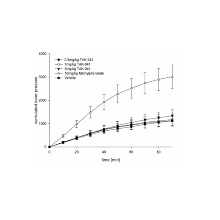The drug TAK-041 enhances motivation
TAK-041 is a drug that activates brain receptors known as GPR139. Our current study aims to clarify how this drug is distributed in the body and to identify its receptor binding profile including binding affinities. Our extensive body of evidence indicates that, by binding to GPR139, TAK-041 increases the intracellular calcium concentration in vitro, penetrates the brain rapidly, and has a favorable pharmacokinetic profile. Microdialysis measurements further indicate that the compound does not appear to have actions on the brain reward system indicative for addictive effects. Importantly, our behavioral studies in rodents further highlight that TAK-801 has motivation-enhancing properties.
Apathy refers to a lack of motivation, i.e., a reduced willingness to exert effort for a “reward”. Apathy is a common symptom in many psychiatric and neurological disorders, including depression and schizophrenia. Our present preclinical study suggests that stimulation of GPR139 receptors could be a molecular mechanism ("drug target") to enhance motivation and to alleviate apathy. TAK-041 could be a appropriate drug.
This work was carried out in a collaboration between Boehringer Ingelheim, Biberach, the Psychiatric University Hospital Zurich and the Research Unit "Systems Neurobiology " of the University of Stuttgart.


